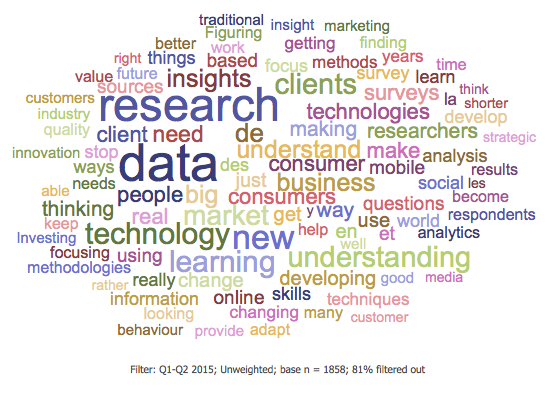Categories
May 19, 2015
GRIT Sneak Peek: The Secret To Success In 30 Years Is…
A sneak peek of the upcoming GRIT report section “If market researchers want to be successful in 30 years, they should be doing this now.”
0
By Jeffrey Henning
We asked GRIT participants to select a few voluntary questions to answer pertaining to their views on the short and long-term changes in the industry. For one of those questions respondents were asked, “If market researchers want to be successful in 30 years, the one thing they should be doing right now is…”
1856 respondents gave us their thoughts, creating a very robust sample of opinions to analyze. Despite this volume of responses, they are clustered around a few key themes: Big Data, moving past surveys, improving the respondent experience, keep learning, and expanding the data source/methodological toolbox.
Here is a selection of the verbatims from each cluster:
To succeed tomorrow, researchers must master Big Data today.
-
“Understanding how all forms of Big Data deliver insights as much of Big Data will replace many of the social science aspects of market research. Data science, data mining, machine learning are skills that researchers need to embrace ASAP. In addition, researchers as project managers will be extinct. Researchers need to spend more time understanding how they can deliver value to the front-lines where the consumer transacts with the business.”
-
“Assessing Big Data and their quality. There’s both plenty of gold out there and as well plenty of crap, simply having faith that Big Data IS the truth is not enough, people must start to be more critical and, as for every fieldwork data, check the quality of data collection. Those who learn to do this now will be the ones who will be successful in the future.”
-
“Look at Big Data and text analytics with market research eyes, understand them and apply the adequate questions. We should be able do use analytics to help our clients reach their business goals, and to do that we should create new methodologies that incorporate it.”
-
“Reshape researchers profile to deal with a totally new environment where traditional MR will become just an ingredient of Big Data. Need for new analytical skills as well as more proactive competencies to face the need of a consultancy role and reach higher level of relationship within client organizations.”
Some respondents want researchers to move beyond the survey.
-
“Stop thinking like market researchers and start thinking about understanding…. stop thinking that changing a survey to mobile is an invention…..or stalking consumers activities is an invention…..just to really understand and adapt.”
-
“Help dismantle all decision-making processes based on survey-based market research and design new internal processes that fit the new ways of generating insights (experimental design and Big Data analytics).”
-
“Stop doing research using panels and surveys. Engage in a natural dialogue with people (not respondents or consumers even). Stop saying we can predict the future. We cannot. But we can give you the most plausible future scenarios instead. In thirty years, we can tell what people really think, believe, trust and what drives behaviour. Only to find out there are still many unknowns that have an impact to the future which we cannot control nor predict. In that sense, innovation will never stop in our profession!”
-
“Training new researchers to ASK QUESTIONS. That includes asking clients questions to get to the bottom of what’s REALLY important. Not just survey questions; REAL questions.”

Others want researchers to improve surveys.
-
“Becoming data agnostic, that is, aggregating information from multiple sources if appropriate to get the whole story. Perhaps related, designing surveys that can be crossed and combined from different respondents so that no one respondent has a survey more than 5-10 minutes, or only has surveys that are interactive and probably verbal.”
-
“Figuring out how to reduce survey length to under 10/15 minutes and available via mobile devices. With this, we need to identify sources of available data that can fill in the blanks that were cut from the longer survey. Taking disparate data points and bringing them together to answer the same questions one longer survey could answer.”
-
“Coming up with new ways to engage the consumer and get more accurate survey results. This includes utilizing virtual reality, incorporating games into surveys, and being able to optimize surveys for the mobile experience.”
-
“Reinvent the way they source consumer data, look to turn more passive rather than survey driven, or at the very least keep survey questions minimal and augment respondent provided feedback with passive, interconnected, Big Data elements.”
To help organizations learn from their customers, researchers must keep learning.
-
“Move to Big Data and combine predictive modelling with understanding the voice of the customer. Furthermore, MR is a constant search for inspiration, a continuous learning cycle owned by the whole company. How you present the inspiration is at least as important as what you share.”
-
“LEARNING!! I’m finding the new researchers of today aren’t learning the basics of marketing research, specifically good sampling and best quality practices. It seems that price and speed are the only drivers in many of today’s companies and I’m very concerned about where that will lead the industry in the future. IF we provide only bad data driven by poor initial decisions, leaders of tomorrow will look to researchers as providing a disservice and stop utilizing research altogether (which I have already seen happen in 2 companies in the past 2 years).”
-
“Learning to be about more than data and research. Be well read. Have other interests. Develop a knowledge about non-research business-related issues (e.g. finance or branding). Understand how the world works. Know how to communicate. Research may become so specialized (e.g. calling the biometrics expert) that ‘general’ researchers have to know how to select and interpret methodologies and studies far more than they will have to know how to conduct them.”
Technology is inescapable and opens up new avenues for insight.
-
“Pay attention to advances in technology that monitor health, behavior and emotion. Wearables and other devices and the data they provide will be a valuable resource for insights that influence marketing decisions.”
-
“Market researchers need to learn how the current wave of technology will radically change our ability to predict people and market behavior. Contextual ‘web’ based purchasing, mobile and wearable computers coupled with machine learning and AI and cognitive science/psychology will integrate and accelerate until we have an entirely different ability to predict people’s intentions.”
-
“Embrace new technologies without being scared of them. Understanding what they can or *cannot* do for market research. Develop clear ideas how we can use technology without forgetting what we do best — work with data.”
-
“Don’t lose the foundational methodologies of today and yesterday (understanding how to do a paper survey or CATI is still important), but look for ways technology and enhanced techniques can improve upon those foundations.”
-
“All about technology. Everything about data – whether quant or qual. Using, apps. Plus, knowing how to talk to the consumers. Plus knowing how to turn a mountain of data into an actionable 1-page report for clients.”
It seems as if the consensus is clear: the future keys to success have little to do with traditional methods as the primary drivers of the industry, and subsequent questions in the report reinforce this conclusion.
Disclaimer
The views, opinions, data, and methodologies expressed above are those of the contributor(s) and do not necessarily reflect or represent the official policies, positions, or beliefs of Greenbook.
Comments
Comments are moderated to ensure respect towards the author and to prevent spam or self-promotion. Your comment may be edited, rejected, or approved based on these criteria. By commenting, you accept these terms and take responsibility for your contributions.
More from Jeffrey Henning
Research Methodologies
A Festivus for the Rest of Us Respondents
Reflecting on how we can improve survey design for respondents.
Brand Strategy
Aliens vs. Dinosaurs
Given the diverse backgrounds of market researchers, there is a real need to continuously train.
Insights Industry News
Researchers and the Love of Learning
MRII’s survey on how the market research industry is doing in career satisfaction, growth opportunities, and learning preferences.
#MRX Top 10: The Rise of the Amateur, of AI, and the Death of Expertise
Jeffrey Henning details the 10 most retweeted links shared using #mrx over the last two weeks.
ARTICLES
Top in Quantitative Research
Research Methodologies
Moving Away from a Narcissistic Market Research Model
Why are we still measuring brand loyalty? It isn’t something that naturally comes up with consumers, who rarely think about brand first, if at all. Ma...
Sign Up for
Updates
Get content that matters, written by top insights industry experts, delivered right to your inbox.
67k+ subscribers




